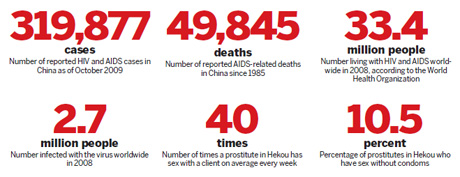Society
Overcoming the scourge of AIDS
By Guo Anfei in Yunnan and He Na in Beijing (China Daily)
Updated: 2010-07-22 09:05
 |
Large Medium Small |

No official figure is available on how many foreign prostitutes work in China but Wan Shaoping, professor from the Sichuan Institute of Dermatology and Sexually Transmitted Diseases (STD) Prevention, said their numbers have swelled in recent years, with women arriving from Russia, Myanmar, Mongolia and Eastern Europe.
"Foreign prostitutes are in a high-risk group for AIDS and other STDs, mainly as they often do not use condoms," he said. "Also, their target customers are migrant workers, tourists and people who frequently cross borders, which makes STD prevention work even more difficult."
Wan argued that dealing with sex workers from overseas is more challenging for police as they usually enter the country illegally, while some simply outstay tourist visas.
"The best way to solve the problem is for the governments to increase the coordination with others countries," he said. They also should enhance health education in schools and among migrant workers.
'Paradise' cost
The town of Hekou sits at the lowest point of Yunnan and, although small, has a big reputation for being a "man's paradise".
On Vietnam Street, people walk around in traditional Vietnamese conical hats and sandals, and the shop shelves are stocked with goods from south of the border.
According to a sex trade worker, Vietnam Street is a hot spot for prostitution, with more than 500 women plying their trade along the 200-meter stretch of road. Prostitutes sit outside its many hotels and "hair salons", with most of them obvious by their scant clothing.
Pimps and touts are also busy at work. When China Daily reporters visited the neighborhood, a middle-aged woman was handing out business cards for a girl called Ms Saigon.
A fruit vendor in the street, where the buildings are mainly two or three stories, said prostitutes live and do business above the street-level shops.
Turning down one hutong revealed a line of "salons" and "spas", where the doors were either closed or blocked by women in heavy make-up smoking cigarettes.
"I'm just 20 years old," one of the women said to China Daily reporters in the local Miao dialect. "I'll make your night wonderful if you choose me."
The room behind her was small and sparsely furnished with just a table, some chairs and worn wood sofa. A handful of hairstyling tools were scattered on the table.
The woman, who claimed to be from Hanoi, capital of Vietnam, said she worked for a man who "has several prostitutes". Her pimp was not in Hekou that day, she said, although there were a few large intimidating men hanging around in case of any trouble.
She refused when reporters invited her to get a drink because her boss "doesn't allow me to go out".
In a nearby "beauty shop", Li Tie (not his real name) said he had seven Vietnamese girls but explained they had already been "rented out", with four in Sichuan province, two in Hubei province and one in Yunnan's capital, Kunming. They will return next month, he said.
"Don't pity these girls. They earn at least 10,000 yuan ($1,400) a month and can even get 30,000 yuan," he went on. "Of course, they need to share the money with us, or else why would I bother with them?
"Most of these girls come from poor backgrounds in Vietnam. Some of them worked as waitresses in restaurants and their incomes were only about 200 yuan a month."
Both of Ruan Najin's parents are poor farmers and would have been unable to afford her siblings' education had she stayed at home, she said.
"I receive more than 10 customers a day at most but I don't do that every day. Sometimes it is only one or two customers," she said. "Business has not been bad up to now and, taking away what I give to my boss, I can earn more than 10,000 yuan a month."